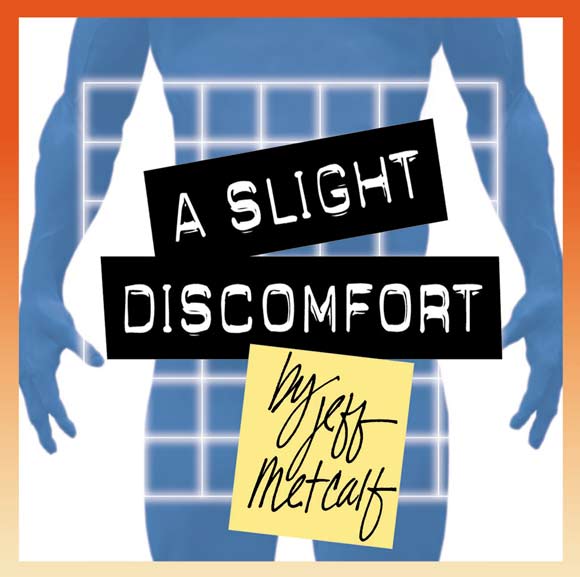Prostate Diaries
 Radio— You don’t want to think about prostate problems. What man over 50 would? Jeff Metcalf certainly didn’t; until the diagnoses in 2004: prostate cancer. That’s when Metcalf, an English professor at the University of Utah, began keeping a journal. His diaries open as a play this summer.
Radio— You don’t want to think about prostate problems. What man over 50 would? Jeff Metcalf certainly didn’t; until the diagnoses in 2004: prostate cancer. That’s when Metcalf, an English professor at the University of Utah, began keeping a journal. His diaries open as a play this summer.
Here’s the HV radio version, written by Jeff Metcalf, performed by Paul Kiernan, recorded by Scott Carrier, produced by Larry Massett, music by Parazitii, “A Slight Discomfort: My Prostate Diaries” (53:00 mp3):

Theatre— “A Slight Discomfort” runs October 1-12 2008 at the Salt Lake Acting Company Chapel Theatre, 168 West 500 North, Salt Lake City 84103 (801-363-7522).
 Links— Writes Jeff Metcalf: Perhaps after listening you have some unresolved issues. You’re looking for answers. I get it. I’m there with you. The internet has a million plus places full of info, but here’s a few websites I found easy to make my way around…
Links— Writes Jeff Metcalf: Perhaps after listening you have some unresolved issues. You’re looking for answers. I get it. I’m there with you. The internet has a million plus places full of info, but here’s a few websites I found easy to make my way around…
Phoenix5—
It’s got pictures. We like pictures. It gets down to the important stuff like, “Can I still get it on?” and “If so, how so?” Straightforward with links to anecdotal first person narratives.
Each male who has undergone RP will tell you that sex after RP is not the same. Period. However, when examining specific details, each person’s experience is different. One man on a PCa mailing list indicated he had sex with his wife less than 5 weeks after surgery; another man continues to indicate he was not had an erection or an orgasm in more than 4 years. That is some difference!
Us TOO International Prostate Cancer Network—
If you’re looking for cool hats and wristbands to trumpet support for the fight against prostate cancer, this is the place. Seriously, this site is more formal and has the disease broken down into very logical categories. The glossary is understandable and helps answer your own questions without getting distracted.
• Prostate cancer is the most commonly diagnosed cancer in American males today.
• Prostate cancer is the second leading cause of cancer death in the United States.
• Prostate cancer is mainly found in men age 55 or over with an average age of 70 at the time of diagnosis.
• Every year over 232,090 men are diagnosed with prostate cancer, and about 30,350 die. If detected early, prostate cancer is often treatable.
• Majority of deaths from prostate cancer are related to advanced disease with metastases.
Prostate Cancer Foundation—
Visually engaging and easy to manipulate. Video-clips, research information, and a good sort of ‘meat and potatoes’ guide from A-Z of what to expect.
The prostate is a small, squishy gland about the size of a walnut that sits under the bladder and in front of the rectum. The urethra, the narrow tube that runs the length of the penis and that carries both urine and semen out of the body, runs directly through the prostate; the rectum, or the lower end of the bowel, sits just behind the prostate and the bladder.
YANA– You are not alone!—
This Australian site has a sense of humor. A panic button on the first page. It’s designed with practical and thoughtful questions in mind. One of the first pages I visited; it seemed manageable and not overwhelming.
In spite of what you may have read, very few men die from Prostate Cancer. Less than 5% of male deaths in the USA are from this disease. Compare this with heart conditions which cause about 35% of male deaths in the USA.
Association for International Cancer Research—
A relatively small website. A breakdown of several types of cancer, not specifically designed for prostate. What made this work for me was the FAQs section on prostate cancer. It was digestible and understandable immediately.
The main symptoms are: difficulty passing urine, inability to urinate, passing urine often (particularly at night), weak or interrupted urine flow, pain when urinating, blood in the urine and pain in the lower back, hips and upper thighs. However, all of these symptoms can also be caused by other conditions such as benign prostate enlargement. Men with any of these symptoms should consult their doctor.
Johns Hopkins Reports: Treating Prostate Cancer—
We’re talking about a legendary institution here. Johns Hopkins, my friends. Just one page but I liked it because you can get free information mailed to you on the “7 Steps to Treating Prostate Cancer.” Honestly, it wasn’t any better than any other site but I like getting stuff in the mail.
Believe it or not, many of the things you need to know are simple, common sense precautions. In fact, adding fruits, vegetables, and grains to your diet can be a great way to help avoid prostate cancer. Reducing your red meat consumption is another good idea.
Cancer Information Network: Prostate—
It is, what it is. Good connection to other websites for those looking to find specifics. I thought this was important because it had some articles focused toward women. “What Women Should Know” is a very understandable and inclusive article that brings women into the equation.
The title of my talk and my book is The Prostate–A Guide For Men and the Women Who Love Them, because men frequently do not take very good care of themselves, and it is their wives, their mothers, their sisters and their daughters often times who fill that need. I wrote this book to educate women and to empower them to learn about this subject. There are three very important diseases of the prostate. Most men don’t even know they have a prostate until they develop one of them because the prostate does not have an important physiologic function.
Prostate-Help—
One of my favorite websites. It was designed by Don Cooley, who maintains it out of his own pocket. It has a great “Exclusively for Men” and “Exclusively for Women” Forum sections that candidly discuss the everyday problems facing people involved in dealing with prostate cancer. Still very much a work in progress.
Before you make any treatment decision you MUST have your slides read by an Expert. I cannot tell you how important this is. We have seen men diagnosed with Gleason score of 8 when in fact they were a Gleason score of 6. We also have seen a Gleason score of 4 turn out to be a Gleason of 8 when checked by an expert. As much as 50% of the local pathology doctors may be wrong.
Malecare—
I immediately liked their very simple quote: “Millions of men are diagnosed with cancer… there is a lot you can learn from us.” Good, easy index on the front page that offers information on everything from Gay Prostate Cancer to Enlarged Breasts to Choosing a Surgeon.
Prostate Cancer is diagnosed in about 13-15% of men of European descent. Men of African or African-American descent are twice as likely to have prostate cancer cells as men of European descent. Men of African descent are often diagnosed with advanced prostate cancer. If you are reading this, you are not dead. Even diagnosed with prostate cancer, chances are good that your cancer won’t kill before something else does.
PSA Rising—
Good because it has hotline information on several forms of cancer with international links. Many offer immediate help and are often manned by cancer patients themselves. This site squarely has its feet planted, and warns against getting information from drug companies. Perhaps, oh what a surprise, that might be a conflict of interest.
The PSA test is a simple blood test to measure how much PSA (prostate specific antigen) a man has in his bloodstream at a given time. The PSA test is the most effective test currently available for the early detection of prostate cancer.
 Keep the faith brothers! We are not alone!
Keep the faith brothers! We are not alone!
Photos courtesy Jeff and University of Utah College of Humanities.